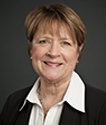By DICK HUGHES/Oregon Capitol Insider
Rep. Caddy McKeown, D-Coos Bay, minced no words.
“My communities have been in a recession for about 40 years now,” she told participants at the Oregon Leadership Summit this week in Portland. “We have high rates of poverty, child abuse, domestic violence, obesity, the capital murder rate, shorter life span, all because poverty has been imposed on us for quite time.”
Many residents still have pride in their community but also sadness that their children will leave for jobs and education elsewhere.

Because the need for social services is so great, the local Department of Social Services staff is so large that it ranks among the county’s main employers — a symptom of the dearth of family-wage jobs. McKeown, whose district stretches from Yachats to Coos Bay, wondered how the advances in artificial intelligence and other technologies being touted at the leadership summit would have any benefit to her region.
“We don’t want a handout. We don’t want a hand up necessarily. We want to be able to take care of ourselves, and that’s very difficult when you live in rural parts of Oregon.”
As McKeown spoke, fellow panelist Rep. Lynn Findley, R-Vale, nodded in agreement.
“It’s a matter of perception on urban vs. rural. If you’re in Portland, you think Wilsonville is rural. But if you’re in Eastern Oregon, you’re pretty darn sure all of Western Oregon is urban,” he said.
Urban folks believe they are giving rural Oregon a helping hand, he said. “But the perception from rural folks is, we don’t get a helping hand. We get the boots to the throat that we’re held down and we’re struggling mightily because we’re trying to live with a one-size-fits all regulatory system.”
Neither had kind words for the current political relationship, which McKeown called passive-aggressive. Small communities are treated as pawns for the benefit of someone else’s political advantage or disadvantage and not allowed to help pull themselves out of their dire circumstances.
“I don’t think our communities that are struggling now and have been for some time choose to have these issues. They are imposed upon us. They are decisions that are made outside our purview — in Salem and on the East Coast,” McKeown said.
“The folks that I represent have very broad points of view. One of the things that they do agree on is that our economy deserves to have a chance to improve, and it really is a struggle for us to understand why at times we are not allowed to have those investments made.”
Neither Findley nor McKeown is running for re-election, and they were breaths of fresh air amid the softball questions posed by panel moderators. (Findley is seeking a state Senate seat.)
Rural-urban relationships came up throughout the 17th annual summit, held at the Oregon Convention Center in Portland.
Most information in the main sessions probably was not new to people who closely follow state and national business and government. However, I’ve come to realize that many around the Capitol, or perhaps in other sectors, hold in-depth knowledge of their particular issues but might know little about other topics. For example, legislators often are deeply familiar only with the bills that have come before their committees. Conferences such as this might fill in the gaps.
Statewide elected officials, U.S. senators, members of Congress and legislators can attend the summit for free. Other folks must pay, including city and county elected officials, staff members, lobbyists, representatives of nonprofits, and members of the public.
Senate President Peter Courtney, D-Salem, told the gathering that it constituted “an extraordinary group of people” and suggested state agency heads should be involved in such a retreat.
“The agency heads are more important than even governors,” he said, adding that business and agency management could learn from one another, and include city managers as well.
Elected officials cannot close the urban-rural divide, he said, but city managers and agency directors could help do so.
The state budget is one place where the Legislature does not discriminate against rural Oregon, according to Courtney. But when it was Findley’s turn to later in the day, he recounted how Eastern Oregonians had been rebuffed when seeking help in getting the Legislature to think outside the box.
Dick Hughes, who writes the weekly Capital Chatter column, has been covering the Oregon political scene since 1976. Contact him at TheHughesisms@Gmail.com, Facebook.com/Hughesisms, YouTube.com/DickHughes or Twitter.com/DickHughes.


